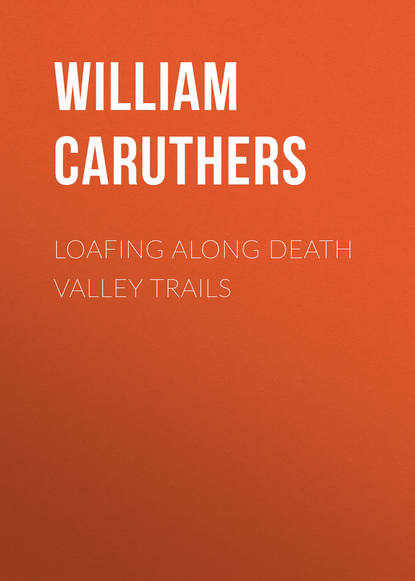По всем вопросам обращайтесь на: info@litportal.ru
(©) 2003-2024.
✖
Loafing Along Death Valley Trails
Настройки чтения
Размер шрифта
Высота строк
Поля
She said: “He went up to the tunnel to set off three blasts. I heard only two. He was to come after the third blast. I knew something was wrong and went up. Bigod, Mr. Caruthers, Jack’s head was blown off to hellangone…”
Myra’s language failed to mask the grief her welling eyes disclosed.
Only once in her long, helpful life did Myra ever stoop to deception. The old age pension law was passed and Myra was entitled to and needed its benefits, but Myra wouldn’t sign the application. She made one excuse after another, but finally Stella Brown got at the bottom of her refusal. Myra had been married to Jack for 40 years and just didn’t want him to find out that she was a year older than he. Mrs. Brown at last persuaded her to put aside her vanity.
“Hell – ” Jack grinned when told about it. “I knew her age when I married her.”
On cold winter nights Myra could always be found in the Snake House where a chair beside the stove was reserved for her. One night I said jestingly: “You never play poker. What are you doing here?”
She whispered: “Wood’s hard to get. I’m saving mine.”
Then came one of those mornings when one’s soul tingles with the feel of a perfect desert day and Myra was up early. She came to the store.
“What got you up at this hour?” Bernice asked.
“I felt too dam’ good to stay indoors…”
There were a few old timers in the store and these surrounded her – because she was the kind who could tell you that it was hotter than hell, in a thrilling way. She bought a few groceries and started back to her cabin. Friendly eyes followed her passage along a path across the playground of the little school. Children sliding down the chute or riding teeter boards, waved affectionately. Myra was seen to falter in her step, then sag to the sand. The children ran to her aid and in a moment Shoshone was gathering about her. Myra Benson was dead.
Sam Flake, nearing 80, on the fringe of the crowd paid his simple tribute in a voice a bit shaky, but in language hard as the rock in the hills: “Dam’ her old hide – us boys are going to miss Myra…” He turned aside, his hand pulling at the bandana in his hip pocket and Shoshone understood.
Though she was buried 500 miles away, every man, woman, and child in Shoshone wanted a token of love to attend her and about the grave that received her casket was a wilderness of flowers.
Chapter XX
Odd But Interesting Characters
In these pages the reader has seen familiar names – the favored of Lady Luck – but what of those who failed – the patient, plodding kind of whom you hear only on the scene? They too followed jackasses into hidden hills; made trails that led others to fortunes which built cities, industries, railroad; endowed colleges and made science function for a better world. To these humbler actors we owe more than we can repay.
For nearly half a century John (Cranky) Casey roamed the deserts of California and Nevada looking for gold. His luck was consistently bad. Grim, tall, erect, with a deep slow voice, he was noted for picturesque speech which gained emphasis from an utterly humorless face. Congenitally he was an autocrat – his speech biting.
A prospector whom Casey didn’t like died and friends were discussing the disposition of the remains. “Chop his feet off,” suggested Casey, “and drive him into the ground with a doublejack…”
From others one could always hear tales of fortunes made or missed; of veins of gold wide as a barn door. But no trick of memory ever turned Casey’s bull quartz into picture rock. “Never found enough gold to fill a tooth,” he would say.
Casey’s leisure hours were spent over books and magazines, chiefly highbrow – particularly books and journals of science.
A tenderfoot was brought in unconscious from Pahrump Valley. A city doctor happened to be passing through and after an examination of the victim, turned to the men in overalls and hobnail shoes, who’d brought him in: “He’s suffering from a derangement of the hypothalamus.”
“Why in the hell don’t you say he had a heat stroke?” Casey barked.
A notorious promoter had a city victim ready for the dotted line. “Double your money in no time… Samples show $200 to the ton…” Assuming all prospectors were crooked he called to Casey sitting nearby: “Casey, you know the Indian Tom claim?” “Yes, I know it,” Casey thundered. “Not a fleck of gold in the whole dam’ hill.”
In the thick silence that followed, the beaten rascal flushed, looked belligerently at Casey but Casey’s big, hard fists he knew, could almost dent boiler plate and the long arms wrapped about a barrel, could crush it flat.
In time Casey acquired an ancient flivver. Only his genius as a mechanic kept it going. There were lean years when it bore no license and he kept to little-traveled roads. The car, like Casey, was cranky and phlegmatic. One day as he was coming into Shoshone it balked in the middle of the road, coughed, shivered, and died. Inside the store it was 120 degrees. Out on the road where Casey stopped it was probably 130. For two hours he patiently but vainly tried to coax it back to life. Finally he stood aside, wiped the grease from his gnarled hands, calmly stoked his pipe and shoved the car from the road. Then he gathered an armful of boulders and with a blasting of cussing that shook Shoshone he let go with a cannonade of stones that completed its ruin.
At the age of ten Casey had been taken from the drift of a city’s backwash and put in an orphanage. Nothing was known of his parentage or of relatives. He came to the desert after a colorful career as a conductor on the Santa Fe. The late E. W. Harriman, having gained control of the Southern Pacific system had his private car attached to a Santa Fe train for an inspection tour. At a siding on the Mojave Desert, Harriman wanted the train held a few moments. His messenger went to Casey, explaining that Harriman was the new boss of the Southern Pacific.
“This is the Santa Fe,” Casey bristled, looking at his watch. “I’m due in Barstow at 11:05 and bigod I’ll be there.”
Aboard his train he was a despot and a stickler for the rules, demanding that even his superiors obey them. This finally was his downfall and he came to the desert.
Elinor Glyn, who made the best seller list with “Three Weeks” in the early part of the century, came to Rawhide and Tex Rickard, spectacular gambler undertook to show her a bit of life a la Rawhide. He took her to the Stingaree district and later to a reception in his own place. The state’s notables were presented to the lady along with Nat Goodwin, Julian Hawthorne, and others internationally known.
Tex saw Casey standing alone at the end of the bar and knowing he was a voracious reader he went to Casey: “Come on and meet the author of Three Weeks…”
“I’ve read it,” Casey said. “They’ve hung folks for less.”
Casey’s method of getting a job when his grub ran out was unique and unfailing. He would storm into the store and turn loose on Charlie, in charge of the roads and long his friend. “Who’s keeping up these roads? Chuck holes in ’em big as the Grand Canyon … disgrace – ”
“Been waiting for you to come in,” Charlie would say with a sober face. “Get a shovel and fix ’em.”
A good conscientious worker, Casey would put the road in shape, pay his debts and again head into the horizon.
You who spin through Death Valley or along its approaches owe much to Casey, who made many of the original road beds the hard way – with pick and shovel.
At last Casey got the old age pension and his latter years were the best. His home, a dugout in the bank of a wash near Tecopa. With no rent, with books and magazines and the solitude he loved, he lived happily. “When I croak,” he often said, “just put me in my dugout. Toss a stick of dynamite in after me. Shut the door and cave in the goddam’ hill.”
One night he went to Tecopa. Friends were doing a spot of drinking and far behind in his score with the years, Casey joined them. There was nothing out of line. Just yarns and memories and Casey had a lot of these. Tonopah. Goldfield. Rawhide. Ely. Foundling days.
“… They put me in a religious school. Had no relatives. In those days they whaled hell outa you just to see you squirm. ‘Casey,’ the teacher would ask, ‘who swallowed the whale?’ How did I know? Then he’d drag me off by the ear and blister my bottom. I shoved off one night. Been on the loose ever since.”
As he drank from his bottle of beer he suddenly slumped – and died instantly. Because of the intense heat, Maury Sorrells, now Supervisor but then Coroner, ordered immediate burial.
Someone recalled Casey’s wish to be put in the dugout and the hill blown up and started for the dynamite. But Whitey Bill McGarn warned that it would violate the law. One-eyed Casey – no relation, but long a friend, suggested a wake until the grave was dug. “It will be daylight then and we’ll plant him in the wash right in front of his dugout.”
This was done as the sun came over the hills and I like to think that somewhere in the after life, all is well with Casey.
Ben Brandt, previously mentioned, was a big blond man with child-like blue eyes, huge gnarled hands and the strength of an ox. He wore enormous boots, but when he bought new ones he always complained that they lacked traction and would go immediately to the dump, salvage an old tire casing and add two inches of reinforcement to the soles, with half a pound of hobnails. Ben then was ready for travel – provided he could find his burros.
Near remote Quail Springs Ben dug a 4×4 mine shaft 75 feet deep, without aid. Descending by ladder he would fill a 10 gallon bucket with dirt, climb out and bring it to the surface. Day after day, month after month Ben applied the power of two strong arms and two strong legs. “With an engine you could do it in half the time,” Ben was told. “I’ve got plenty of time,” Ben drawled.
Ben disdained gold in quartz formation. “I like placer. It’s a poor man’s game. If you find gold you put it in your poke and you’ve got spending money.”
Ben kept five burros and being industrious, never lacked a grubstake. He avoided argument except upon one subject, and that was burros versus Fords in prospecting. “I can get anywhere with my burros. I find stalled flivvers all over the desert and my burros drag ’em in.”
Ben believed that a burro had at least some of the intellectual powers of man. “Read a clock good as you,” he said. “I worked my burro, Solomon, on a hoist. He didn’t like it. I got up every morning at daylight, by an alarm clock. Slept out and kept the clock on a boulder at my head and got up when the alarm went off. One morning I woke up with the sun shining straight down in my eyes. It was noon. That burro had sneaked up and taken that clock down the canyon a mile away. Don’t tell me they can’t think! I sold him. Too smart.”
I asked Ben once what he would do if he suddenly found a million dollar claim. “I would build a monument a thousand feet high on top of Telescope Peak and dedicate it to burros.”
Such a monument would inadequately express the debt today’s world owes that little beast. Here are some of the things that link your life to the burro:
The springs and the mattress in the bed you were born on. The talc that powdered you. The soap that bathed you. The ring you slipped on the finger of the girl you love. The paint on your house. The glass in your windows. The tile in your bathroom. The enamel ware in your kitchen. The prescription your druggist fills. The fillings the dentist puts into your teeth. The coin and the currency you spend. The auto you ride in and finally the casket in which you leave this world.
Wars have been won or lost and the credit of nations stabilized because a burro carried a prospector’s grub into faraway hills.
Ben’s burros strayed and he’d just returned with them after a two days’ hunt. He was sitting on the bench mopping his brow when Louise Grantham, the girl with the mine in the Panamint, came up. She needed pack animals to get the ore down to the road. She’d tried before, to trade her Ford pickup for Ben’s burros, but he’d never shown a flicker of interest. In a voice pitched for Ben’s ears, she said to Ernie Huhn: “If Ben didn’t waste so much time hunting those jacks, he might find a mine.”







